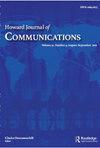Proud: Examining the Social Media Representation of Ibtihaj Muhammad
IF 0.8
Q3 COMMUNICATION
引用次数: 0
Abstract
Abstract The media portrayals of sportswomen especially Black and Muslim women tend to be monolithic, focusing only on oppression of the body and the barriers they face for entry into sport. Using the fencer Ibtihaj Muhammad as a case study, with an eye toward transnational feminism, this multimodal discourse analysis study found her social media representation provides complex insight into what it means to Black, Muslim, and a woman in a traditionally white and elitist sport. Muhammad seems to typify the many contradictory images one associates with white, Western sportswomen on social media; combining empowerment and commodification while leaving out one of the main visages often epitomized with it, the sexualization of the sportswomen form. As more scholars study sportswomen’s presence on social media and their activism, how athletes use these digital spaces to construct their identity is sure to have implications for how researchers also study collegiate athletes’ use of marketing and branding in the new era of name, image, and likeness. As Muhammad shows, sportswomen who historically have been exploited by the big business of sport because they are Black or Muslim, can now be assured a space for economic empowerment.骄傲:审视伊卜蒂哈吉·穆罕默德在社交媒体上的表现
媒体对女运动员,尤其是黑人和穆斯林女性的描述往往是单一的,只关注她们对身体的压迫和她们进入体育运动所面临的障碍。以击剑运动员Ibtihaj Muhammad为例,着眼于跨国女权主义,这项多模态话语分析研究发现,她的社交媒体表现提供了复杂的视角,让人们了解在传统的白人精英运动中,这对黑人、穆斯林和女性意味着什么。穆罕默德似乎是社交媒体上许多与西方白人女运动员相关联的矛盾形象的典型;将赋权和商品化结合在一起,同时忽略了一个经常被它作为缩影的主要形象,即女运动员的性别化形式。随着越来越多的学者研究女运动员在社交媒体上的存在和她们的行动主义,运动员如何利用这些数字空间来构建自己的身份,肯定会对研究人员如何研究大学运动员在新的名字、形象和相似性时代对营销和品牌的使用产生影响。正如穆罕默德所展示的,历史上因黑人或穆斯林身份而受到体育大生意剥削的女运动员,现在可以确保获得经济赋权的空间。
本文章由计算机程序翻译,如有差异,请以英文原文为准。
求助全文
约1分钟内获得全文
求助全文
来源期刊

Howard Journal of Communications
COMMUNICATION-
CiteScore
2.70
自引率
10.00%
发文量
23
期刊介绍:
Culture, ethnicity, and gender influence multicultural organizations, mass media portrayals, interpersonal interaction, development campaigns, and rhetoric. Dealing with these issues, The Howard Journal of Communications, is a quarterly that examines ethnicity, gender, and culture as domestic and international communication concerns. No other scholarly journal focuses exclusively on cultural issues in communication research. Moreover, few communication journals employ such a wide variety of methodologies. Since issues of multiculturalism, multiethnicity and gender often call forth messages from persons who otherwise would be silenced, traditional methods of inquiry are supplemented by post-positivist inquiry to give voice to those who otherwise might not be heard.
 求助内容:
求助内容: 应助结果提醒方式:
应助结果提醒方式:


